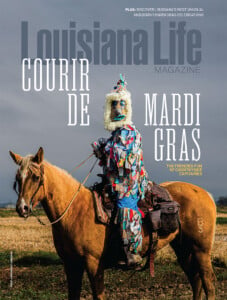Who Gets The Baby?
The Evolution Of Louisiana’s Cake

There was a time when king cakes were a mere side attraction to Carnival, served mostly in classroom parties and during office breaks. A New Orleans’ baker had borrowed from the French tradition of Gallette des Roi and prepared what amounted to a cinnamon coffee cake, glazed with purple, green and gold icing and packed with a plastic baby hidden inside.
Since the Carnival season starts on January 6th, The Feast of the Epiphany, the baby represented Jesus, who was supposed to have been visited by three men, popularly described as either kings, magi or wise men, and who were out riding camels.
Moreso than the cake, the baby, or some other favor described by the French word fève, would become the source of interest in the king cake experience. Tradition had it that whoever got the slice with the favor would have to provide the next king cake. Thus, evolved perhaps the world’s first self-marketing confection.
There were those who received the loaded slice but did not play be the rules as they strategically coughed into a napkin to spare themselves of the responsibility.
Something happened, however, to the simple king cake ritual; the cakes would become more flavorful, more popular statewide and, by far, more daring in their contents. Hello boudin king cakes!
At first it was just injections of new flavors, sort of like making an oval jelly donut, only bigger and with more variety, like chocolate, cream cheese or blueberry, (a personal note here— yum!).
Originally, king cakes were described as being sweet; now there are “savory” alternatives.
When done right, boudin is one of Louisiana’s top foods, mixing ground meat with rice and seasonings and then stuffed it all into a case. (Note, I am talking about the so-called “white boudin” and not the more daring “red boudin” or blood sausage, which is a whole different food that I am not sure I want to include in a king cake).
Ah, but the standard white boudin! At first, I was taken aback by the idea, but why not? Combining the savory with the sweet and some sort of confection is not too different from what my Aunt Doris in Moreauville used to fix when she served boudin with biscuits on the side and a splash of Louisiana’s Steen’s syrup, which is made from homegrown sugar cane. That dish could not be more native.
Search the internet and be stunned by the number of recipes and bakery listings offering the cakes. There is also a hint about why there has been such a culinary revolution.
King cakes never travelled very far out of Louisiana, but now Amazon, Fed Ex and UPS have made them global. A king cake baked in Lafayette could conceivably be eaten in Paris a couple of days later.
Because of the internet, king cakes have become such a big business that some bakers are selling the confection year-round and linking it to other holidays. Fourth of July king cakes are probably not too far way, though they shouldn’t be “King’ but “President.”
And there is still room for more innovation. Whatever your favorite king cake flavor may be, albeit boudin or blueberry, don’t forget the Tabasco.

Errol Laborde
Executive Editor
Errol@Louisianalife.com
Louisiana Insider
Catch up on the latest podcast episodes
Episode 159
The Artistry and History of Louisiana’s Capitol
“A Tall Order: The Louisiana State Capitol,” a documentary produced by Louisiana Public Broadcasting, tells the story of the state capitol building’s history and architecture. Both are imposing. GUESTS Dorothy Kendrick, the documentary’s producer, and Steve Losavio, an architect with the Louisiana Division of Administration.
Episode 158
Food Writer Jessica Harris Links African and American Influences
Jessica Harris has twice won James Beard Foundation awards, including one for Lifetime achievement. Rather than just being in the kitchen, she has proved herself to be especially skilled at blending sentences and paragraphs and then seasoning the mix with a generous heaping of knowledge to create fresh culinary history. For one of her recent books, “High on the Hog” she went to Africa to discover some of the links between African cooking and classic American dishes. Her Netflix series based on the book was so successful that a second season has been produced.
